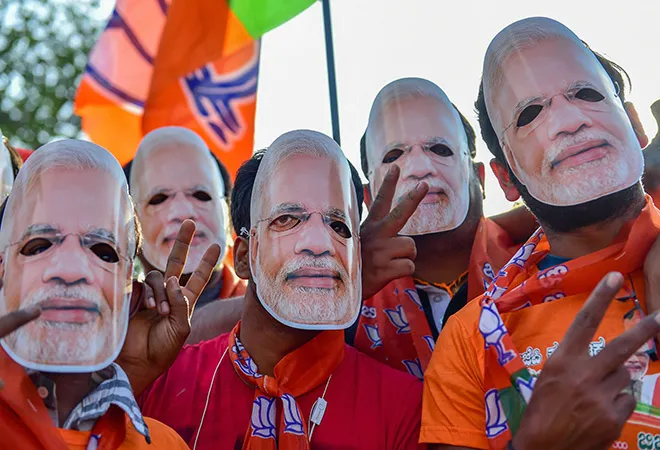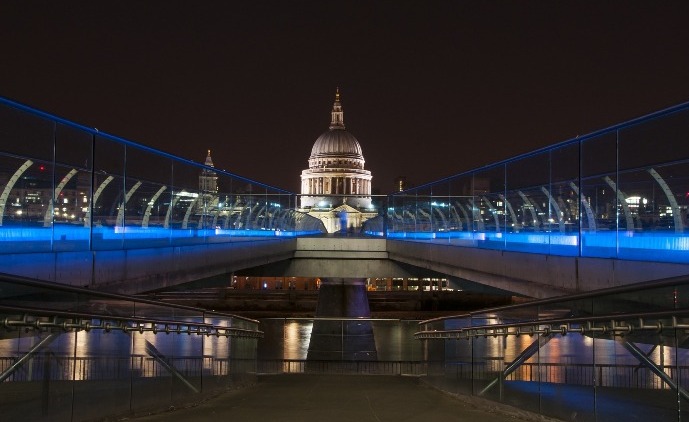-
CENTRES
Progammes & Centres
Location
The possibility that over the next few years the Commonwealth might become an Anglo⎯Indian project is now in the air.

British civil servants responsible for the recent Commonwealth Heads of Government Meeting held in London breathed a sigh of relief seeing India’s Prime Minister Narendra Modi walk down the aircraft stairs. Waiting alongside the High Commissioner to greet Modi was Boris Johnson and a retinue of senior officials from the Foreign and Commonwealth Office. There had been a lot riding on Modi’s attendance; after all, the leader of India represents more than 50 percent of the Commonwealth’s total population. It is as much an Indian endeavour as a British one, in that sense. Certainly, London’s diplomatic corps were out in style to greet leaders from 53 countries and to explore the future prospects of an institution — the Commonwealth — that might be a key plank in Britain’s global posture. Modi’s attendance was crucial to the event, and given the fact that no Indian leader had attended in 10 years, his acceptance was a significant message to London. Back in India, the media portrayed Modi’s attendance as an effort to step up its role across global forums. While the overall summit has been judged largely a success, the real significance is where an emerging India stands in relation to a Global Britain.
Modi’s attendance was crucial to the event, and given the fact that no Indian leader had attended in 10 years, his acceptance was a significant message to London.
Brexit is occurring at a not⎯auspicious time. The current international political order is in flux, perhaps the victim of its own success. As this ORF paper notes, it is a “period of unprecedented global structural changes and shifts in balance⎯of⎯power equations.” While some have portrayed this as “the rise of the rest,” this has evolved into a more traditional binary — with the rise of China and India falling into geostrategic, Mahanian patterns over the future of what is now being called the Indo⎯Pacific. The New Great Game is manifesting itself in both maritime and naval interconnectivity — and the implied control of sea lanes and ports — and in “development diplomacy.” Xi is redrawing the map of the Asian landmass with the Belt and Road Initiative, while securing China’s energy and trade routes through a ‘String of Pearls’. India, surrounded — and some might even say “contained” — by China’s grand projects, is wary of Beijing’s ambitions in its near⎯abroad. Are these projects built to extend Chinese power or diminish India’s? Of late, view from India has pointed toward the latter of these two options.
The New Great Game is manifesting itself in both maritime and naval interconnectivity — and the implied control of sea lanes and ports — and in “development diplomacy”.
In response, India has turned East with its Act East Policy under which it is improving relations with countries like Vietnam that Beijing might view to be inside its own 9⎯dashed sphere of influence. Paralleling Beijing’s own tactics in Sri Lanka, the Maldives, and others, New Delhi is using trade and diplomacy as a basis for these relations, and interestingly promoting Buddhism as a unifying element. In direct response to China’s apparent encirclement, India has also been working to become more active in its own maritime domain by initiating agreements and projects with its neighbours and allies. One major project, which might push Indian life into the Asian continent is the new International North South Transport Corridor (INSTC) linking India, Russia and Iran by a land route through 13 countries. This year will mark the official operation of this trade route, potentially leveraging Indian soft power in the region. While the recent Xi⎯Modi meeting was designed to press the “reset button” on bilateral relations, structuralists will argue that the two Asian powers are bound to continue to compete as they rise.
No longer the great imperial power it once was, Britain has a delicate dance to perform in this grand sweeping maelstrom of events. Global Britain remains an aspiration, a dream, and perhaps even — a slogan for UK trade missions. But there is room for optimism as well as cynicism, given the UK’s own government language on the “rules⎯based order.” In freeing itself from the European continent, Britain’s primary concern remains Russia. But there is a genuine search for a new global role among London’s foreign policy elites. One saw this in the miles of red carpet rolled out for its historical partners in the Commonwealth and the Anglosphere. The dynamics in the Indo⎯Pacific are far away, but they remain of deep strategic interest to London because of the maritime and trading aspects. After all, many of the region’s newest powers are merely mimicking what Britain perfected over 300 years — the synthesis of great power strength through a maritime trading empire.
 Britain has a delicate dance to perform in the maelstrom of events.
Britain has a delicate dance to perform in the maelstrom of events.
Global Britain remains an aspiration, a dream, and perhaps even — a slogan for UK trade missions.
In the modern era, the Sino⎯Indian competition compels Britain to a certain posture. While China remains an important trading partner, its links to India are much greater, across the political, legal and civil sectors, and across peoples. Lest we forget, 1.5 million Britons are of Indian ethnic origin; the largest minority in the UK. The presence of such a strong diasporic network enriches cultural exchange, forming a ‘living bridge’ between the two countries. While there is a large scope of improvement in the areas of trade, business and economy, there seems to be hints of optimism pointing to the outlooks. Modi’s April visit saw the two agree to a new Tech Partnership and a Trade Partnership, with the motive of driving a 15 percent jump in trade. Given India’s population, its rapidly advancing economy and its growing importance in the world order, Theresa May’s government is only one of a long line of recent Prime Ministers who view the bilateral is punching below its weight.
While it is too early to tell, the possibility that over the next few years the Commonwealth might become an Anglo⎯Indian project, is now in the air. After all, if the UK gives a greater role for India, it becomes a tool for Delhi to exert a global leadership that it has yet to satisfy through BRICS and the SCO. For its part, by aligning with Delhi, London takes a major step into the Indo⎯Pacific as a strong partner to the rising power that respects democracy and human rights. It also enables the UK’s elites to refashion rhetoric around the rules⎯based order, into a framework for Global Britain. On the other, India would have to itself ‘a prospective forum for its power projection’ in which China is not a member. The India⎯Commonwealth Small and Medium Enterprises (SME) Trade Summit hosted in 2017 is an example of the scope of integration the Commonwealth could achieve in the future should member countries be given a greater say. One cannot disregard the political scope of an institution with 53 member countries ning five continents in today’s increasingly interlinked and complex world order. Britain and India are both in need of ways to further their foreign policy agendas and strengthening bilateral ties. As an international platform, the Commonwealth could play a pivotal role in the pursuit of their short⎯term and long⎯term strategic goals. To quote Modi, “Once we have decided to do something, we can go miles ahead.”
John Hemmings and Tanya Sen are Director, Asia Studies Centre, and Research Intern at the Henry Jackson Society, London.
The views expressed above belong to the author(s). ORF research and analyses now available on Telegram! Click here to access our curated content — blogs, longforms and interviews.

Dr John Hemmings is Associate Professor Daniel K. Inouye Asia-Pacific Center for Security Studies Hawaii USA.
Read More +